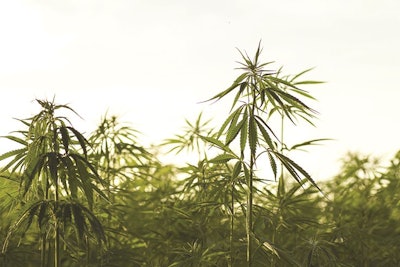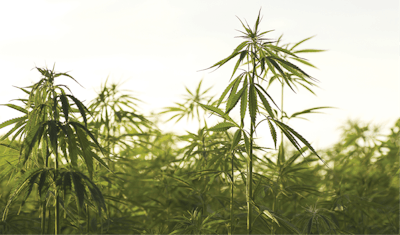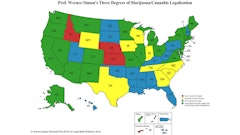
Integrated into the Farm Bill is the bipartisan-supported Hemp Farming Act of 2018. The act’s inclusion is significant: industrial hemp and its derived products now are legal on a federal level, and states may choose how to move forward in this exciting new industry.
Spearheaded by Sen. Mitch McConnell (R-KY), The Hemp Farming Act federally legalizes the production of industrial hemp (defined as Cannabis sativa L. plants containing less than three-tenths of a percent of tetrahydrocannabinol (THC)). The low concentration of THC makes hemp unsuitable for marijuana production, which remains federally illegal.
Brief Historical Overview
Prior to the 2018 Farm Bill, federal law regarding industrial hemp was a patchwork of statutes, regulations and court decisions that allowed for the importation of certain hemp products, but not for the domestic production of the crop.
The Controlled Substances Act (CSA), 21 U.S.C. § 802(16), generally defines “marihuana” as every part of the plant Cannabis sativa L.—except for mature stalks, ungerminated seeds and products made therefrom—and labels it Schedule I, a category for substances with no possible medical use. LSD, heroin and MDMA are examples of other Schedule I narcotics.
THC itself is also deemed a Schedule I substance, prompting the Drug Enforcement Administration (DEA) in 2003 to use its authority to regulate substances under the CSA to ban all parts and products of the Cannabis sativa L. plant, because THC is impossible to fully remove from those products. Consequently, litigation was filed to enjoin the DEA’s new rules, and the 9th U.S. Circuit Court of Appeals held in Hemp Industries Association v. Drug Enforcement Administration, 375 F.3d 1012 (9th Cir. 2004), that banning products with THC in non-psychoactive amounts was outside the DEA’s authority. This ruling created the pre-2018 Farm Bill system allowing importation of certain hemp products but barring farming hemp in the U.S.
Subsequently, the Agriculture Act of 2014 (2014 Farm Bill) defined industrial hemp as strains of Cannabis sativa L. plants having THC content of no more than 0.3 percent on a dry weight basis. The 2014 Farm Bill created a legal regime on the federal level that authorized individual states to establish programs for cultivating industrial hemp for research purposes. This bill allowed for the research of industrial hemp but did not authorize the legal commercialization of industrial hemp in the U.S.
2018 Farm Bill
The 2018 Farm Bill abolishes this inconsistent treatment by removing industrial hemp from the definition of “marihuana” in the CSA. In addition, THC contained in industrial hemp will be removed from the purview of the CSA, making clear that industrial hemp plants can be grown domestically as well as imported. This amendment to the CSA decriminalizes the production and use of hemp and its derived products that match the definition of industrial hemp, such as seed oil, CBD oil, fibers and paper.
Industrial hemp will not be entirely unregulated, however. The 2018 Farm Bill moves regulatory authority from the CSA and DEA to the Agricultural Marketing Act of 1946 (AMA) and the Department of Agriculture. The AMA authorizes and directs the Secretary of Agriculture to carry out programs to assist the production, transportation and marketing of crops. Now that the Hemp Farming Act of 2018 is law, hemp will be treated the same as any other legal crop by the Department of Agriculture, with a few caveats based on its previous status as a controlled substance and the potential for unscrupulous growers to cultivate strains with high THC levels.
As part of the amendment, State and Tribal governments can create their own regulatory framework for industrial hemp production. Those plans must include:
- a practice to record and describe land on which hemp is grown;
- a procedure for testing THC concentration;
- a procedure for non-compliant product disposal; and
- a procedure for enforcing regulations.
The plan may include anything that does not conflict with federal regulations.

Enforcement
Enforcement requirements under the newly revised AMA are significantly reduced from the previous penalties under the CSA. The 2018 Farm Bill’s amendments to the AMA differentiate between negligent violations and violations with a higher mental state (i.e., reckless, knowing or intentional). Negligent violations comprise:
- failing to fully describe production land to the regulating authority;
- failing to obtain a license from the regulating authority; and
- producing products containing more than 0.3-percent THC.
The AMA forbids criminal penalties for negligent violations and prescribes the sole civil penalties. The producer must comply with a plan made by the regulating authority to cure the violation, which includes a reasonable date by which the violation must be remedied. The producer must periodically report their compliance to the regulating authority. Three negligent violations in a five-year period results in a five-year suspension of a producer’s license to grow hemp.
Reckless, knowing and intentional violations of regulations, such as the cultivation of high-THC strains of the cannabis plant or concealing production from regulators, will result in criminal penalties set forth in state and federal laws.
Research
After decades of prohibition, several laws now are amended to allow for research on hemp products. The National Agricultural Research, Extension, and Teaching Policy Act of 1977, 7 U.S.C. § 3319d(c)(3)(E), and the Critical Agricultural Materials Act, 7 U.S.C. § 178c(b)(9), both include industrial hemp in their covered products.
As a provision of the 2018 Farm Bill, the Secretary of Agriculture also is required to commence an economic viability study of hemp and submit the results to Congress within 120 days of the 2018 Farm Bill’s enactment (Dec. 20, 2018).
Insurance
Hemp crops now qualify for federal crop insurance, a voluntary insurance program that guarantees partial payment for crops lost to catastrophic events. The Federal Crop Insurance Act, 7 U.S.C. § 1502 et seq., is amended to include hemp in the covered crops. In addition, the “viability and marketability” requirements for crop insurance, both for production and for research, may be waived at the discretion of the Federal Crop Insurance Corporation.
This is a win for hemp cultivators because crop insurance was non-existent for industrial hemp farmers operating under the 2014 Farm Bill. Access to federal crop insurance will provide more certainty for these cultivators in contracting for the sale of their harvests, even if such harvests are destroyed due to catastrophic events, such as wildfires.
Ben Jones is an associate in Husch Blackwell LLP’s Denver office. His practice involves working with clients starting new businesses and assisting businesses as they expand and evolve.
























